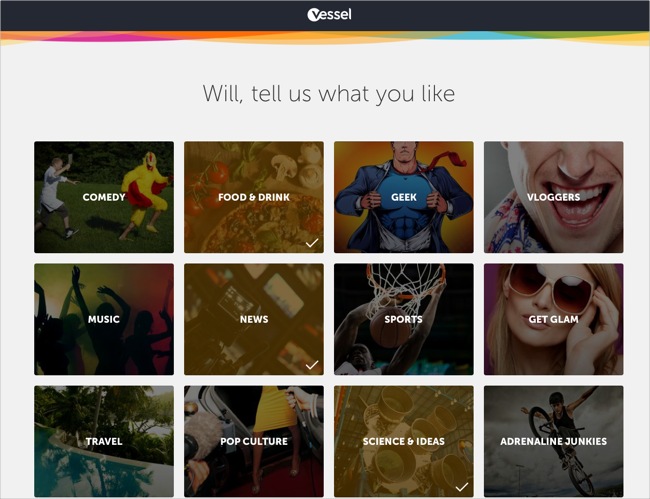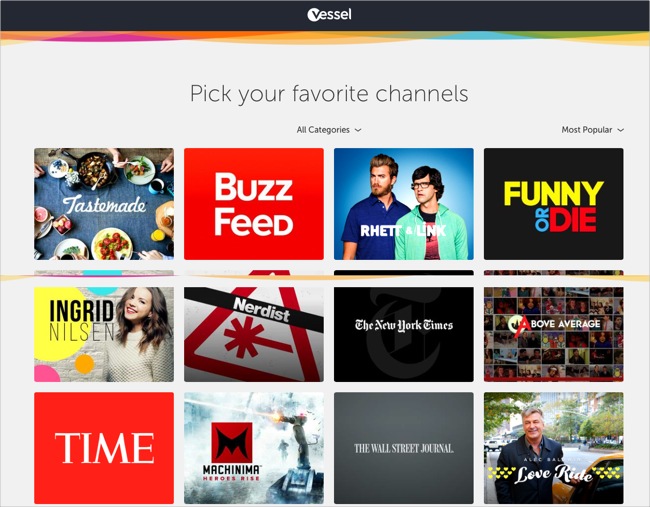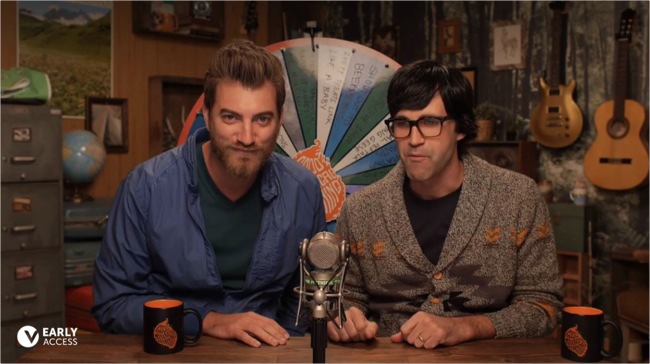-
Hands-On Review of Vessel's New Beta Service
Vessel has launched an invite-only beta of its service, on desktops and iOS devices. I was provided access to the beta and I'm excited to share some initial reactions. As a reminder, Vessel was started by former Hulu CEO Jason Kilar and CTO Richard Tom. Vessel's core value proposition is providing exclusive, early access to online video content to super-fans, for a $2.99/month fee. A light ad load is included.
Vessel is a fascinating test of viewers' willingness-to-pay for early access to online video content that's otherwise free. This so-called "first window" represents a completely new business model that could dramatically alter the online video landscape. For content creators, the lure of higher revenue per video view (given Vessel's more attractive ad splits and subscription revenue) seems irresistible to try. And for super-fans, Vessel's $2.99/month fee seems pretty compelling to get early access.Beyond pricing and content, one big factor affecting Vessel's success is its user experience. Given Hulu's breakthrough design when it launched, I had high expectations for Vessel's user experience. Could it pull together all the intangible things that would differentiate it vs. the raft of free video sites already available?
Having spent some time with Vessel, I think the answer to that question is a resounding "yes." Vessel is simply gorgeous on the desktop, with the app even more impressive. From the moment of sign up and beyond, it's clear that every step of trying to connect the user with valuable, personalized video has been well thought-out.
Following are a few screen grabs to illustrate.
After creating an account, Vessel first asks what you like, and presents a number of categories to choose from:
Then it presents a choice of favorite channels to select:
Last it asks about your favorite music artists:
When you've completed these choices the site quickly loads, with personalized scrolling content displayed. A pull-out navigation widget exposes your picks for categories, channels and music artists, which are editable. You can also search across the entire site.
The UI is punctuated by short looping videos, large colorful images, and minimal text. There are no YouTube-style thumbnails at all on the desktop version, though there are on the app. Playback starts quickly, with periodic 5-second pre-roll ads and interstitial "motion posters." Vessel's initial advertisers include Chevy, Corona Extra, Land Rover, Jaguar and Unilever.
The only surprising thing to me about Vessel is that it's not obvious to the user which videos are actually in the 72-hour early access window (i.e. what a subscriber is really paying for when signing up for Vessel). As I scrolled my feed of videos, there was no early access branding at all. Only when I clicked to play a video did a subtle watermark briefly appear in the lower left corner noting when a video is early access (see below example). As a first-time user, I found it confusing to understand which videos were unique to Vessel vs. readily available at the content creator's own site.
Vessel's spokesman told me that the question of how to message the early access benefit was debated from many angles within Vessel, and that the beta period is meant to gather reactions from users on how to improve the experience. I have a hunch that the ultimate release version will much more clearly mark which videos are early access and that there will be proactive early notification as well. I think these are critical for reinforcing Vessel's value prop.
It's also worth noting that not all of Vessel's content providers plan to allow early access. For now, BuzzFeed, FunnyorDie, Major League Soccer, The New York Times, The Verge, Time magazine brands and VEVO are all "free partners," simply using Vessel as another point of distribution. However, at least 25 other content creators and MCNs have agreed to premier their videos on Vessel, on their regular schedules, which of course vary by creator.
All in all, Vessel is an impressive user experience, especially considering it's a beta launch. The over-arching question still remains whether users will pay for the first window release. Only time will tell, but if Vessel is successful with this model, I'd expect lots of other content creators and aggregators to try doing something similar. A bona fide paid first window for online video would be a very exciting milestone for the industry and Vessel would clearly deserve credit as the innovator.Categories: Startups

